Peter MALONE
Saturday, 18 September 2021 19:33
Ghoul, The/ 1975
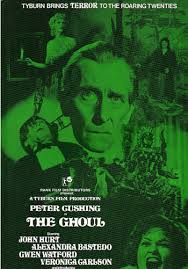
THE GHOUL
UK, 1975, 87 minutes, Colour.
Peter Cushing, John Hurt, Alexandra Bastedo, Gwen Watford, Veronica Carlson.
Directed by Freddie Francis.
The Ghoul is a horror film in the Hammer tradition. Starring, inevitably, Peter Cushing, it also stars John Hurt. The film was directed by Freddie Francis who has made quite a number of horror films and quite a range of subjects. The Ghoul offers its dictionary definition, has its suspense till the monster appears and some delayed horror. It is average horror entertainment.
1. The appeal of horror films: monsters, the monstrous and its behaviour, fantasy, danger, the overcoming of fantasy? The significance of the opening with the games and the testing of fear? Did this symbolize the reaction of the audience?
2. The contribution of the 20s settings: the young party set, the rash decision to have a race, the inexperience of driving in the countryside with the pride of cars, the varying types? The significance of their being lost? Their coping with real danger after testing their fears at a party?
3. The transition from the world of London, expensive cars to the moors, the fog, the mansion, mystery and survival? How effectively was this transition made?
4. The focus on Tom: what kind of person was he, his madness, his role as a servant and assistant, the background of the army and his sense of inferiority, his fascination with women, the oddity of his room, his role in the household his supporting Dr. Lawrence, getting rid of the car, moving to murder, the sense of menace, especially with Angela? Tom as a representation of evil, the ugliness of his death?
5. The contrast with Dr. Lawrence: as an elderly gentleman, as a minister, his confrontation with Indian religion and Christianity, his praying, his dependence on Atiah, his anguish and his caution, his lies to visitors, his allowing victims to be killed? The revelation that the ghoul was his son? The pain of shooting his son? why had he brought him to England, and helped him?
6. Geoffrey and Angela? The atmosphere of threats, death?
7. Ayah and the exotic, the background of India for a flavour for the horror film?
8. The ghoul himself: the definition the film gave at the beginning, the fact that he was off-screen for so much of the time, the atmosphere of menace, the bloodthirsty murders, the human food given to him, the build-up until he was seen, the horror of his eating flesh, the horror of his killing and his death?
9. The quality of this horror film, the value of its being made and shown?
Published in Movie Reviews
Published in
Movie Reviews
Tagged under
Saturday, 18 September 2021 19:33
Ghost Story
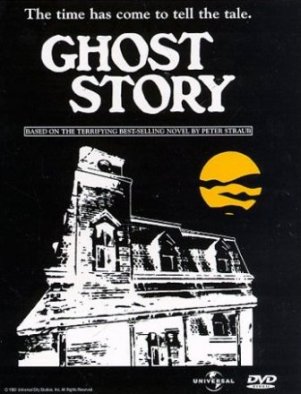
GHOST STORY
Canada, 1981, 105 minutes, Colour.
Fred Astaire, Melvyn Douglas, Douglas Fairbanks Jr, John Houseman, Craig Wasson, Patricia Neal, Alice Krige.
Directed by John Irvin.
Ghost Story has a great deal going for it but it does not achieve as much as expected. Direction is by John Irvin, who had great success with television's Tinker, Tailor, Soldier, Spy and the film version of Frederick Forsythe's The Dogs of War. The film is based on a novel by Peter Straub. There is an excellent cast, especially the coup of having the four veteran stars. There are good supporting roles for Patricia Neal and Alice Krige (from Chariots of Fire).
Photography is by veteran photographer and director Jack Cardiff. However, the film is lengthy, talkative and does not have the vitality needed for this kind of ghost story. (It is a reversal of the 180s trend where young people continually get murdered - here it is the older generation!)
1. The popularity of this kind of horror film in the late '70s, early '80s? The multiple murder genre? The eerie background, ghosts, killings? Horror films and nightmares? The facing of horror? How was this film different? Its effectiveness as a ghost story?
2. The colour photography, locations, atmosphere? Use of light and darkness? Shocks, scares, suspense? The length of the film and its pace? Special effects -violence? The re-creation of the '30s? The contrast with the 'SOS? Musical score?
3. The strength of the cast and their contribution? Atmosphere?
4. An atmosphere of reality and unreality? How willingly did the audience suspend disbelief? The opening ghost stories, the group? Their involvement in a real murder story? A real ghost story? Ghosts and vengeance and justice?
5. The portrait of the four men? Their backgrounds, professional careers, style? Audiences responding to the four stars and their performances in so many films? Audiences identifying with them? Their fears, dreams and waking? Terror? Memories? Their having to cope with a vengeance situation? Death? The sketches of their wives helping them to cope? Edward Wanderley and the death of his son? The funeral? The discussions about what had happened? His argument with his other son? The apparition on the bridge in winter? His death? Jeffrey as doctor, his relationship with his wife, his being haunted by the past? His worry and concerns? His death?
6. David Wanderley and the relationship with the girl, the eerie scene in the apartment, the corpse and his falling to death? His twin brother and the background story of their love for Alma? Don going home to his father and their fights? The story of Alma and the meeting at the university, her air of mystery, erratic behaviour, dates, their living together, her demands, possessiveness and jealousy? Her disappearance and relationship with his brother? His wanting to solve the mystery?
7. Alma (and the meaning of her name - Soul Spirit)? Her beauty, her being an enigma, place at the university, pushing herself at Don, the relationship, her possessiveness, disappearance? Her relationship with David and his death? Her being the ghost of Eva Galli?
8. Hawthorn and Sears James? Their being part of the group, experiencing their friends' deaths, trying to solve the mystery? Hawthorn and his coping, the investigation, the discussions with Don, telling his the story, the visit to the house? Sears and his scepticism? His visit to the house? The car crash and his being haunted to death?
9. The flashback - the group, the spirit of the times, their youthfulness, carelessness, infatuation with Eva? Dances etc.? The accident? The getting rid of the car? its disappearance - and Eva alive at the window? Their cover-up?
10. The return to Eva's house and its eeriness? Don and Hawthorn and their fear? The significance of the Bates brothers and their presence in the street, in the house? In league with Eva Galli? Hawthorn's fear, Don's injury?
11. Hawthorn and his wanting to get help? The car chase and its pace?
12. The dragging of the car from the lake? Don and his confronting the ghost? The dead Eva and the disappearance of the ghost?
13. How entertaining as a story, as a ghost story, as a portrayal of character, as a fable of guilt and being haunted?
Published in Movie Reviews
Published in
Movie Reviews
Tagged under
Saturday, 18 September 2021 19:33
Double Man, The
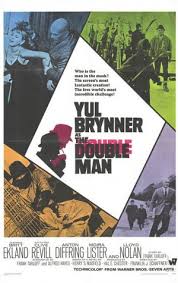
THE DOUBLE MAN
UK, 1967, 105 minutes, Colour.
Yul Brynner, Britt Ekland, Clive Revill, Anton Diffring, Moira Lister, Lloyd Nolan.
Directed by Franklin J. Schaffner.
A very entertaining example of the espionage melodramas that were so popular in the sixties. The popularity of James Bond in the early sixties meant a lot of imitations as well as spoofs. However, there are a number of more serious films, made by serious directors, which were very critical of the glamorising of the spy. The main example of this is the version of John le Carre's The Spy Who Came In From the Cold. Other film examples were The Naked Runner, directed by Sidney J. Furie, The Deadly Affair by Sidney Lumet, The Kremlin
Letter by John Huston.
The Double Man has the touch of glamour but is still critical of the world of espionage. The Austrian snow and ski
background is most attractive, the plan of trapping C.I.A. Agent played by Yul Brynner with his impersonation is quite effective. Britt Ekland is an attractive heroine - acted better in these days than she often did in later films. Clive Revill is very good in support and Moira Lister adds a touch of humour. Direction is by Franklin Schaffner who
had made such films as The Stripper and The Best Man and who was to go on to success with The Planet of the Apes, his Oscar-winning Patton, Nicholas and Alexandra and Papillon.
It is interesting to note that The Double Man theme is very strong in his film version of Ira Levin's The Boys from Brazil with the cloning of young Hitlers.
1. The popularity of espionage films in the sixties - with the glamorous and the critical? How does this film fit into these conventions and the spy genre? The Bond glamorisation and yet the truth about C.I.A. and other organizations and their activities? Spy heroics, disillusionment? How do these films seem in later decades?
2. The importance of the Austrian locations, the snow and the ski resorts? The glamour of skiing, its dangers? The impact of the skiing sequences especially Robert's death? The Iron Curtain background and the continuation of the Cold War - without bombs but with the use of people?
3. Panavision photography, colour, the rousing score? The tone of the credits? Yul Brynner and his portraying the double role?
4. How well did the film arouse audience curiosity, participation? in the plan for Dan Slater? The Army disapproval, the Intelligence and setting out a trap for substituting an agent in Washington? The screenplay and its detailing, step by step the manoeuvres to trap Dan Slater? Audience interest, repugnance? The death of Robert Slater as the first step and the subjective falling down the cliff? audience response to this death and the critique of the word, espionage?
6. Yul Brynner's style as Dan Slater? Seeing him at work, his character and dedication to his work, a hard approach to life? His relationship with his son and its distance, his wife's death? The impact of the telegram, his immediate going to Austria, his arrival at the end of the funeral and his non-emotive grief?
7. His suspicions of the skiing instructor, his suspicions of Frank and his wife? His approach to his son's death with the espionage mentality, suspicions, his criticisms of Frank and his resentment of Frank's telling the truth especially about his relationship with his son? the contrast with Frank's care for his son? Frank's being a former spy but opting out and trying to make a new life? The importance of his comments as they drove in the van to the farm and Frank's judgment about the world of espionage? The critique of this world? The irony that Robert should be aided by his false father? The final impact of the experience on Dan Slater? How would he be in the future?
7. The film's filling in the background of Washington? information, orders, the chiefs in Washington and their files, information, contacts and communication? Miller and his cover and his going to rescue Dan?
8. Dan's moving away in the train, the discovery of the jacket and its impact, his return and confrontation of Frank, his relentless pursuit of the truth and following the steps pre-ordained by his enemies? The discussion with the ticket men, his finding Gina and pursuing her on the slopes, his encounter with his enemy who gave him the information? the continued interrogation of Frank? (The film preparing for the climax by showing the cable car, the mountain, the ski run etc.)
9. The encounter with Mrs Carrington and her contribution of British and ironic humour? Gina and her place in Mrs Carrington's resort, the party? the leads', the information about the farmhouse?
10. Dan going into the trap, Frank's warnings and discussion about espionage, his fear and going away? The fight, the substitution and the repercussions - especially for Frank, brutalising of Gina?
11. Did the audience suspect Frank? His behaviour especially in his panic? his apology to Gina? his finally coming to the rescue and his having to make the decision to shoot the double man? Gina and her seeing the masked man at the cable car, her trying to confront the truth? The final confrontation of all at the top of the cable car? the choices to be made?
12. Audience interest in the presentation of the two men and Yul Brynner's style? the false aplomb of the double man and his coping with the situations? Dan Slater and his escape through the crowd? the melodramatics of the death of the agents, the fights, the final suspense in the choice?
13. The mastermind of the plan and his disappearing and the happy ending for Dan Slater and for Gina?
14. How interesting a picture of international espionage and its activities, mentality? The types involved? Human issues? International security, human life? A critique of this world?
Published in Movie Reviews
Published in
Movie Reviews
Tagged under
Saturday, 18 September 2021 19:33
Dossier 51, Le
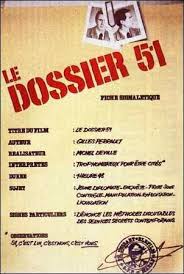
LE DOSSIER 51
France, 1978, 108 minutes, Colour.
Francoise Beliard, Patrick Chesnais.
Directed by Michel Deville.
A French thriller in the spirit of the seventies, especially in the move towards uncovering cover-ups. It is a thriller about surveillance and could be compared with Francis Ford Coppola's 74 thriller, The Conversation. The spies of the foreign power are trying to compile a dossier on a French diplomat whom they wish to have a hold on to sabotage economic negotiations. The film traces in great detail the means used for surveillance, the co-ordinating of the material obtained, the styles of questioning and discovering material about the person under surveillance. At times this is so contrived that it is frighteningly ludicrous. However, it is a grim reality and eventually they do discover the hero's secret and then proceed to gain power over him. The film has a documentary look but has the persuasion of a thriller.
1. An interesting and entertaining thriller? Style, content? Its corresponding to realities of international espionage of the seventies?
2. A French production? French atmosphere, style? For a French audience, international audience? The spy thriller, surveillance?
3. The colour photography, the locations, the special effects used for surveillance and showing the surveillance at work? Musical score? The importance of the editing?
4. How realistic was the plot? The reality of espionage at any time, the sophistication of technology for surveillance? The groups employed in such espionage, their stands, their intelligence, devices? Means and manoeuvres? The inevitability of their succeeding? The contrivance of the screen play with its facts and figures and dates? The screenplay showing what a dossier of surveillance is like? The ultimate impact of the audience sharing in this espionage work?
5. The hero as victim? His being presented in his ordinary situation, his wife, mother, relationships? His skill at his work? Colleagues? The audience and their expectations of his flaw being discovered? The details of seeing him at work, his responsibility, his rising in his career? The ultimate discovery? The screenplay's contriving to have homosexual relationships as his flaw? The power of the group to have a hold over him through this means? The ugliness of the ending and its tragedy?
6. How well did the film detail the characters in Dominique's life? The women, their being interrogated and the devices used for this? His friendships? The homosexual liaisons?
7. The presentation of those involved in surveillance, their speeches, their anonymity9 The people used as agents? Techniques? The submerging of personality and values to their work? Lack of scruple?
8. How interesting were the episodes in the dossier, from a psychological point of view, thriller point of view, the building up of the dossier?
9. Audience response to the final closing in of those surveying? The finishing of the dossier?
10. The sabotage of the dossier and the irony of the group having to begin again? the tragedy of having destroyed a life?
11. The political implications of the film - nations and multinational powers involved in such control? The invasion of privacy and individual rights to privacy? The decision to have a hold on a person, destroy his life? The means and the end? the end supposedly justifying all means?
Published in Movie Reviews
Published in
Movie Reviews
Tagged under
Saturday, 18 September 2021 19:33
Doc Savage, The Man of Bronze

DOC SAVAGE, THE MAN OF BRONZE
US, 1975, 112 minutes, Colour.
Ron Ely, Paul Gleason, William Lucking, Michael Miller, Eldon Quick.
Directed by Michael Anderson.
Doc Savage The Man Of Bronze is a film version of a comic strip character, very popular in the thirties. Kenneth Robeson wrote many books according to a formula pattern with this strong American hero. Many critics consider the film moves away from the spirit of the comic strips and is more akin to the James Bond styles and gimmicks of the sixties and seventies. Powell who had made many excellent science fiction films in the fifties, eg. Destination Moon as well as The Time Machine and Tom Thumb, wrote the screenplay as well as producing.
Michael Anderson who has had a mixed career with films ranging from Around The World In Eighty Days to Logan's Run and The Shoes of the Fisherman is the director. Ron Ely, a former Tarzan, is a strong looking central character. The film anticipates the trend towards portraying comic strip characters which was to move to a climax by the end of the seventies.
1. How interesting an enjoyable an American adventure? For what audience was the film made? Admirers of the comic strip hero, adults, children?
2. The popularity of comics in the past? The popularity of comic strip characters on the screen? The problems of how many dimensions the characters ought to have? The conventions of the comic strip when they are embodied in actors? In situations? Exaggeration, lack of cause or links? How enjoyable are visualised comic strips?
3. Comment on the style of the film - colour, thirties atmosphere, buildings and cars, city locations, South American locations? The presentation of gadgetry? A blend of reality and unreality? Realism and fantasy? The appeal of this kind of comic strip fantasy and audience response to fantasy heroes?
4. How particularly American was the film, the emphasis on the American flag at the beginning, the using of Sousa and his music? and the US in the credits of Sousa's name and the patriotic tone? The particularly American qualities of Doe Savage, his heroism, villains being frightened of him, success?
5. Doc Savage as the American hero in the light of his father and his achievement and exploration? Savage and his own inventions? The Arctic circle,. his car, buildings and their protection? The flag and the song? His solemn pronouncing of his American pledge? The American righter of wrong?
6. Doc Savage as hero?. Ron Ely's appearance, style? The Arctic and his meditation and communication with his group, the New York apartment and the assassination attempt, the time given to the long chase of the villain? The plane and its crashing? The voyage to Hidalgo, his relationship with his group, the people in Hidalgo and the mystery of his father's death? The confrontation with the phosphorescent snakes? The importance of the long trip through jungle, snowy mountains? The high mountains and the dangers? The confrontation with the villains and the Indians? The contrast with Captain Seas? the meal on the ship, the confrontation in the village? The earthquake, the snakes? A series of spectacular adventures and his coping with them all?
7. His band - the introduction to them all, their work, personalities, serious and comic? The scientific skills, legal skills? The importance of Monk and his pig, the humorous sequences with the pig? The comic strip language and discussions amongst themselves, loyalty, behaviour? Dangers? Their capacity for fighting, especially on the ship?
8. The portrait of the villains - Captain Seas and his ambitions, style? The Indians? The man in Hidalgo? the little man and the irony of his turning to gold?
9. The women in the comic strip presentation - Karen and Adriana and their glamour and seduction? Mona and her giving of information, leading them to the village, loyalty? The black and white delineation of the heroines and villainesses?
10. The comic strip material in New York especially with the spectacular effects of the chase and the take off of the plane?
ll. Comic strip adventures in South America?
12. Doc Savage as a hero of the thirties - how well does he translate into later decades? Audience response in later decades? The personalities of his assistants? How much does this reflect the attitudes of the comic strip writers of the thirties?
Published in Movie Reviews
Published in
Movie Reviews
Tagged under
Saturday, 18 September 2021 19:33
Divorce of Lady X, The
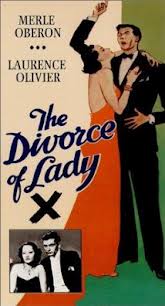
THE DIVORCE OF LADY X
UK, 1938, 92 minutes, Colour.
Laurence Olivier, Merle Oberon, Binnie Barnes, Ralph Richardson.
Directed by Tim Whelan.
A pleasing English pre-war comedy. One of the earliest British films photographed in colour, it is a drawing-room comedy of the style popular on the London stage of the time and of the succeeding years. The strength of the film is in the performances of Merle Oberon, embodying the light heroine quite attractively and Laurence Olivier, early in his career giving strength and solidity (although not the light comic touch most of the time) to the central role of the hero. The film plays with mistaken identities in an intelligent and enjoyable kind of way as well as making strong points about public and private morality. Oberon and Olivier were to star the next year in the United States in Sam Goldwyn's production of Wuthering Heights.
Ralph Richardson has quite a good supporting role in this film. The music is by Miklos Rosza, who was to go to Hollywood and be famous for such rousing scores as Quo Vadis and Ben Hur. The film in of interest especially for an early Olivier role.
1. An entertaining comedy? Of its period, in the forties? Now?
2. The styles of British film-making in the thirties? The productions of Sir Alexander Korda? The use of colour? early British colour cinematography? Drawing-room comedy? The atmosphere of London between the wars? The particular qualities of editing, pacing? How do these stand up in comparison now? The quality of the stars and their contribution to the film's success?
3. The film as an early vehicle for Laurence Olivier? His presence, acting manner, articulation, comedy style? Merle Oberon as a star of the times? Ralph Richardson in supporting comedy role?
4. British manners and morals in the thirties? External morality, marriage and divorce, propriety? The quality of wit, repartee? Qualities of observation of British upper-class life? The critique of standards and morals? The presentation of men and women? Logan and his being enmeshed in a strange situation, changing his life and attitudes and a moral fable in his comeuppance?
5. The portrait of men and women and their relationships? Expectations of behaviour, propriety? The film's sympathy towards women? The presentation of men as chauvinist? The importance of Logan's speeches in the court against women? and Lesley's being in the gallery listening to them and her reaction? His change of heart after his experience and unmasking? His final pro-women speech?
6. Merle Oberon's presence and style as Leslie? A British heroine of the thirties? Laurence Olivier and his balancing her as Logan? Strong presence, articulation, set speeches? A serious and hard comedian? Their handling of the farcical situations, the romantic interludes, the serious undertones?
7. The film spent the first twenty minutes in the bedroom mix-up in the hotel. Proportion of farcical comedy, establishing the characters clearly with their traits, establishing the British setting, the British manners, English wit, interaction, the two characters getting to know one another well, credibly falling in love, the audience getting to know them and believing their falling love? The quality of the writing and the sustained interest in the location of the first twenty minutes?
8. The humour of Logan's mistake? His handling of the situation, feelings of guilt? His loving Leslie despite his thinking she was Lady Mere? The importance of the talks with Lord Mere and his ambiguous behaviour? His confessing to his assistant? The encounters with Leslie and treating her as Lady Mere? What he believed about her as Lady Mere? His foolishness in coming to these conclusions, motivations, dilemma? His decision to go ahead with the marriage? The humiliation and his response to it?
9. The portrait of the Meres? British aristocracy, types, talking, Lady Mere's American background and marriages? Lord Mere and his drinking, court case, easy divorce? The presentation of the country estate, the hunt? Lady Mere as a type and her rendezvous with lover? The comment on this type-of marriage? The contract with Logan and Leslie?
10. The portrait of Leslie? as wilful, scheming at the ball in order to get the room, her contrivance and domination of Logan, her series of manoeuvres to get the bedroom to herself? Her manner in the morning? She being agreeable and Logan being disagreeable and his reaction to this? Her decision not to reveal the truth? Her motives in this? Her presence at the court, her relationship with her grandfather and his knowing about everything? Was she right to continue to pretend? Her grandfather warning her that she might otherwise be unlovable? Her teasing of Logan in the various meetings? Her decision to pursue him? Her manner at the hunt? At the final revelation of the truth and sharing his humiliation?
11. How convincing the reconciliation? The light touch in Logan's final speech in the court? The serious undertones of romance and marriage in the light touch?
12. The contribution of the minor characters? the people at the ball at the hotel, the people in the court especially the women in the box, the judge, the people at the office, the office boy and his announcing of the two ladies, the people at the hunt? Authentic English background of the time?
13. The overall effect of entertainment? Of a humorous and light glance at the issues of love and marriage and propriety?
Published in Movie Reviews
Published in
Movie Reviews
Tagged under
Saturday, 18 September 2021 19:33
Disraeli
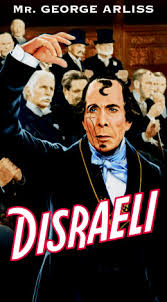
DISRAELI
US, 1929, 90 minutes, Black and white.
George Arliss, Doris Lloyd, David Torrence, Joan Bennet, Florence Arliss.
Directed by Alfred E.Green.
Disraeli is one of the earliest of sound films. In its presentation, especially its series of set pieces and sequences, the use of captions and acting style, it shows its origins in the silent film. George Arliss won one of the earliest Oscars for his performance as Disraeli. He is supported by his wife Florence in the role of Lady Beaconsfield.
Of interest is the early performance of Joan Bennett who was to be a star for the next half century. The black and white photography is by veteran photographer Lee Garmes. The presentation of the politician and the Suez crisis is still of great interest. Enjoyable in its own way and an interesting historical film.
1. The awards that the film won, its merits in its time, the influence of silent films, impact now?
2. How evident was the transition from silent to sound in the techniques of the film: the setting up of sequences, the silent style of acting, the use of captions, the recording quality of the sound?
3. The black and white photography, the fluidity of the camera, the not pieces especially Parliament, royal receptions etc?
4. How interesting a portrait of Disraeli? for the thirties, as reflecting the impact in his own time and an understood by posterity? The portrait of a man, a politician, a statesman? An adequate tribute to the man and the politician and his achievement? The presentation of the man as a hero, his weaknesses and strengths?
5. The film's placing of Disraeli within British history: his dreams and plans of empire, his vision for England, the role of India. the Suez Canal and the comments made about it? Digging a ditch in the sand? The opposition of Gladstone and others? Was the opposition clear and its motives?
6. The initial portrait of the ordinary people opposed to Disraeli, the bankers? Considering him an alien? Anti-Semitic? feeling? The quick sketching-in of the opposition and then the presentation of Disraeli and his supporters?
7. The qualities of George Arliss's style in presenting Disraeli, visually, manner, Parliament, his office work, the encounter with Mrs Travers and counter-espionage? His home sequences and the bond with his wife? Her support in crises, the romantic melodrama with her illness at the end? His support of Charles and challenging him, his fondness for Clarissa? A rounded portrait of a man at home, coping with ordinary situations and coping with affairs of State? The importance of diplomacy and of concealment, in manner?
8. Disraeli as a politician: His way with words, the quality of his speeches and rhetorical skill? His basic insight for having the Suez Canal, his attitude towards the Russians? His encounters with the bankers and their opposition, reliance on Hugh Myers, the confrontation with the bankruptcy? Mrs Travern and her husband? The importance of his bullying the head of the Bank of England? The irony of the official rewards and the public words about the issues? Was he a credible Prime Minister in such times?
9. The portrait of Mary, her love for Disraeli, her standing by him, her coping with political difficulties, her illness and the happiness of the ending? sentiment appropriately incorporated into the political portrait?
10. Clarissa, as a fiery young woman, Charles and his stiffness? The humour of the proposal sequence, Clarissa, and Disraeli modifying Charles, the English hero and his valiant efforts for the Canal, his rewards? Clarissa and her being made party to the negotiations?
11. Mrs Travers as a spy, her place in society, her presence and her methods, her relationship with her husband? The confrontation scene and her not being defeated?
12. The qualities of the film as an early sound drama, political interest, dramatic suspense? The portrait of the British Empire in the 19th century, in the 1930's, the impact of the Empire now?
Published in Movie Reviews
Published in
Movie Reviews
Tagged under
Saturday, 18 September 2021 19:33
Dunwich Horror, The
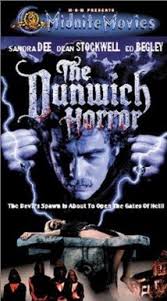
THE DUNWICH HORROR
US, 1970, 80 minutes, Colour.
Sandra Dee, Dean Stockwell, Ed Begley, Lloyd Bochner, Sam Jaffe.
Directed by Daniel Haller.
The Dunwich Horror is quite a good and stylish horror film from American International with Roger Corman (the maker of a number of horror films, especially those from Edgar Allen Poe stories) as executive producer. Daniel Heller, the director, worked with Corman as Set Designer. Heller directed several films including Pieces of Dreams and Buck Rogers in the 20th Century. The cast is a mixed group - each with rather different style and not exactly blending persuasively for a horror film. Of interest, Talia Coppola, later Talia Shire from such films as Rocky, makes a brief appearance.
1. The appeal of the horror film? Scare, fright, atmosphere, suspense, imagination and fantasy, nightmare? Symbol of good versus evil?
2. The work of H.P. Lovecraft? the Edgar Allen Poe tradition? American Gothic? The tradition of English horror and its being transplanted to the United States? How persuasive an American horror atmosphere?
3. The English tradition of witches and their power? Secret books and rituals? The New England tradition of witchcraft with Salem, etc.? This film as an updating of New England witchcraft? The credibility of these stories, audience superstition and belief in the Devil and witchcraft?
4. The atmosphere of the late sixties? American universities, modern style, youth? The psychedelic colours? Special effects? The credits? The musical score? The importance of atmosphere, menace, fright and nightmare? The sound effects of the monster twin? The final rituals?
5. The necronomicon, the tradition of books about witchcraft and their mystery, kept secret, theses being written? The atmosphere of Wilbur trying to get the book, Dr Armitage and his knowledge? The background of the New England villages, the people, their attitudes towards witches? The book and the power of sacrifice, destruction?
6. Nancy as heroine and audience identification with her? Lavinia as the wholesome American type? her work, study, guidance of Dr Armitage? The encounters with Wilbur and her fascination with him? Growing involvement, staying, being drugged, prepared for sacrifice? The innocent girl as victim of witchcraft?
7. Ed Begley's style as Dr Armitage? the country scholar, the knowledge about the occult, the hostility towards Wilbur, friendliness towards Nancy? The final confrontation and its melodramatics with Dr Armitage against Wilbur?
8. The supporting characters and their contribution: Elizabeth and her friendship with Nancy, help, investigations in the household, her fears, unleashing the twin, death? Cora and her death?
9. The mysterious character of Wilbur - mystery and pleasantness, persuasiveness with Nancy, her falling in love with him, the purposes of his getting her to the house, drugging her, the preparation for the sacrifice, the finale and the confrontation with Dr Armitage and his destruction? The mystery of the twin, his being unleashed, the rampage of destruction?
10. The build-up to the confrontation and the editing with the sacrifice, the violence and death? The twin?
11. Nancy and her future - giving birth to another Wilbur?
12. The appeal of the horror film? The conventions and the direct presentation of these and audience response? How satisfying horror entertainment?
Published in Movie Reviews
Published in
Movie Reviews
Tagged under
Saturday, 18 September 2021 19:33
Down Among the Sheltering Palms
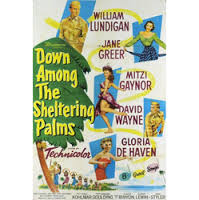
DOWN AMONG THE SHELTERING PALMS
US, 1953, 87 minutes, Colour.
William Lundigan, Jane Greer, Mitzi Gaynor, David Wayne, Gloria de Haven, Gene Lockhart, Jack Paar.
Directed by Edmund Goulding.
One of the many routine musicals made by 20th Century Fox in the early fifties with roughly the same cast. There is a bit of sparkle but not in comparison with, say, M.G.M. musicals.
William Lundigan who was in many of these films did not have the presence of other stars. Jane Greer in not exactly a musical star. However, Mitzi Gaynor does her best and David Wayne appears briefly. The film was made at the time of South Pacific's popularity on the stage and the similarities are more than coincidental. The film was referred to as a poor man's South Pacific. It was directed by Edmund Goulding who made such enjoyable films as Grand Hotel, Dark Victory.
1. An entertaining musical comedy of the fifties?
2. The conventions and tradition of the American musical comedy easy plot, light hero and heroine, conflicts and jealousies? The supporting cast? Songs and their role in the plot and exposition of character, choreography? The World War II background and the South Pacific?
3. Colour photography, the atmosphere of the South Pacific? The score? Songs, dances?
4. The background of the war stories with the comic touch? The occupation by American troops? The out of bounds for the troops? The friendly islanders? The prim heroine? The missionaries? Outside authority and confusion? The jealous lady journalist? The sorting out of everything and the happy ending? Sufficient credibility for this kind of musical comedy?
5. The delineation of the characters - stock characters and responses? The hero, popular, a man of honour, compromised by the islanders and the girl, in love with the heroine, the deceptions? The victim of the lady journalist's jealousy? The heroine and her place with the missionaries, her attraction towards the hero, criticism of him, sternness and strictness? Potential jealousy? The clash? The wince, advice of her uncle? The happy reconciliation?
6. The presentation of the islanders - the presuppositions about the South Pacific as paradise? The island Chief, his interpreter, the South Pacific as paradise? the girl and her presence in the hero's hut, her own boy friend and the happy ending?
7. The presentation of the journalist and her jealousy, her finishing up repentant with the second in charge?
8. The comedy of the American Services and the tradition - the men and their preoccupation with girls, comedy types amongst the troops for example, the typist, the men and their rebellion, sticking up for their leader at the end? The authority figures and their supervision?
9. Basic themes of right and wrong, the American spirit, true love, jealousy - all with the bland and pleasant fifties' touch?
Published in Movie Reviews
Published in
Movie Reviews
Tagged under
Saturday, 18 September 2021 19:33
Dead Before Dawn
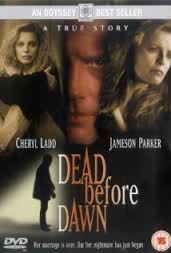
DEAD BEFORE DAWN
US, 1993, 93 minutes, Colour.
Cheryl Ladd, Jameson Parker, G.W. Bailey, Keone Young, Kim Coates, Matt Clark, Hope Lange.
Directed by Charles Correll.
Dead Before Dawn is an interesting American telemovie, designed for a popular audience, showing a family which is subjected to violence by its outwardly respectable father and husband. He then hires a killer to murder his wife and the film becomes melodramatic. It also becomes complex because the killer that he hires by means of a mediator is actually an FBI agent. The film builds up some tension as regards the plan the FBI has to conceal the whereabouts of the wife and lead the husband to believe that she is dead and so entrap him.
Cheryl Ladd is rather glamorous as the wife and mother who suffers at the hands of her brutal husband, Jameson Parker, like many brutal husbands able to conceal his violence towards his family from the public and his friends. G.W. Bailey is the FBI agent and Kim Coates (always a strong villain in many telemovies) seems perfectly suitable as the would-be killer - and it is a surprise to find that he is FBI. Matt Clark and Hope Lange are Cheryl Ladd's parents.
The film raises the issues of violence in the family, the violence towards women and children, the even murderous intent of such brutal husbands.
1. Interesting telemovie? Violent families? The murder thriller? FBI investigation? How well did they combine for an entertaining film?
2. The affluent world of the family, the home? The grandparents' home? Offices? The contrast with the seediness of the mediator for hiring murderers? The dark meeting places? The musical score?
3. The title and its melodramatic tone for the film?
4. The introduction to the Edelman family, Linda and her friends, the preparation for party, the introduction to her husband, the genial host, the children and their being introduced to the guests? The contrast with his behaviour in the kitchen, attacking his children when they wanted to watch the party, sending them to bed, his physical brutality towards his wife? Covering up when somebody came into the kitchen? The setting of the tone for the film? Robert Edelman and his background, his in-laws not wanting him to be their daughter's husband, the years passing, his brutality, Linda, her bringing up the children, the perfect hostess, allowing herself to be brutalised, hoping that things would change?
5. Robert and his going to James Young, the recommendation for contact, the roundabout way of asking for an assassin? James Young, his background - later exposed as fake? His approaching Zac, setting up the situation? The discussions between Young and Robert, no money passing between them that was in any way identifiable? The irony that the FBI were aware of James Young, his approaching Zac, Zac being an agent? The discussions, the audience not in the know, Zac and his following Linda, the photographs? The surprise at his true identity?
6. Masterson and his approach to Linda, the revelation of what was happening, her reaction, their plan, the involvement of her parents, of the children? Her main concern about the children?
7. Robert, quickly getting a new girlfriend, the divorce, his custody of the children on their days off, talking about Linda and getting his children to bad-mouth her? The little boy and his anger with his mother, criticisms? The little girl and her support? Linda and her having to cope, move out of the house, go to her lawyer's, move back?
8. The legal background, Robert paying for Linda's lawyer and his not giving her any help? Her finding Ike, his help, the FBI connection?
9. The in-laws, genial, John and his deafness, Virginia and her helping with the daughter? Linda's sister and her comments? The plan for the children, the FBI taking the grandparents into their confidence? Linda going, Ike hiding her? The empty house, the neighbour and her friendliness, knowing that the bed wasn't slept in, her sister and their going to the police?
10. Robert's reaction, his glad that he was free of her? The irony of Young going to talk with Zac and being arrested? Robert not signing anything - but taped, going to his office, the humiliation of his arrest?
11. Linda, being reunited with her parents, with her children?
12. The film's dramatising violence within the seemingly respectable families? The effects on the wife, on the children? The role of the courts? The dangers of this kind of psychopathic husband and father?
Published in Movie Reviews
Published in
Movie Reviews
Tagged under